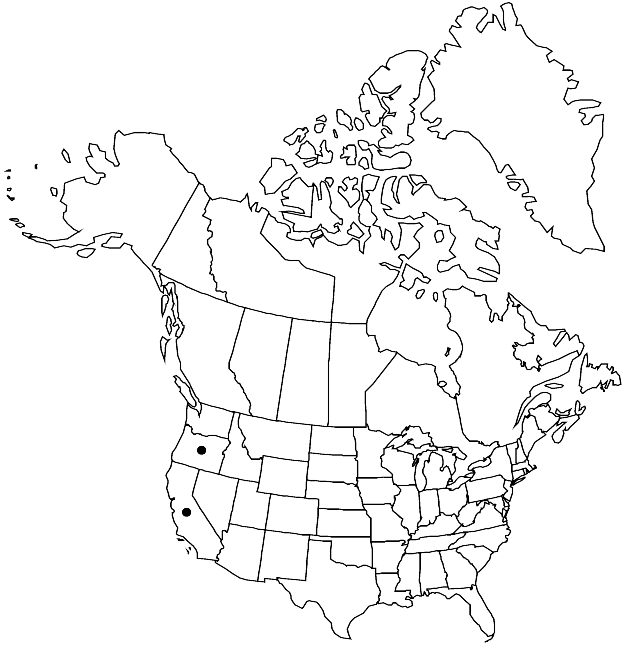Streptanthus glandulosus
Icon. Pl. 1: plate 40. 1836.
Annuals; (usually glaucous distally), often sparsely to densely hirsute proximally, sometimes glabrous throughout. Stems unbranched or branched throughout, 1.5–12 dm. Basal leaves (soon withered); not rosulate; petiolate (petiole winged); blade lanceolate to oblanceolate, 1–15 cm, base narrowed to petiole, margins coarsely dentate to ± lobed. Cauline leaves: blade linear-lanceolate to lanceolate or oblanceolate, 1–12 cm × 1–11 mm, (smaller distally), blade auriculate to amplexicaul, margins entire or coarsely dentate, (often entire distally). Racemes ebracteate, (lax, secund or not, rachis usually straight, rarely flexuous). Fruiting pedicels ascending to divaricate or spreading, (straight or recurved), 2–32 mm, (glabrous or pubescent). Flowers (zygomorphic); calyx urceolate; sepals white, greenish white, cream, yellow, rose, purple, lilac, maroon, reddish purple, or purple-black, (lanceolate to broadly ovate), (3–)5–10(–13) mm, not keeled, (glabrous or sparsely hirsute); petals lavender, purple, or white (sometimes with brown or purple veins), 7–17 mm, blade 2–7 × 1–3 mm, (subequal or adaxial pair distinctly longer, more recurved), margins crisped, claw 5–13 mm, wider than blade; stamens in 3 unequal pairs; filaments: abaxial pair (distinct), 4–9 mm, lateral pair 2.5–7 mm, adaxial pair (exserted, connate 2/3 their length), 5–13 mm; anthers: abaxial and lateral pairs fertile, 1–2.5 mm, adaxial pair sterile, 0.3–1 mm; gynophore 0.2–1.5 mm. Fruits ascending to divaricate or spreading, smooth, straight, curved upward, or arcuate, flattened, 3–11 cm × 1.5–2.5 mm; valves each with prominent midvein, (glabrous or sparsely to moderately hirsute); replum straight; ovules 22–70 per ovary; style 0.1–2.5 mm; stigma subentire. Seeds ovoid to oblong, 1.5–2.1 × 1–1.5 mm; wing 0.1–0.5 mm wide, continuous.
Distribution

w United States.
Discussion
Subspecies 8 (8 in the flora).
Except for the widespread subsp. glandulosus, the subspecies are highly restricted and six are of conservation concern.
Selected References
None.
Lower Taxa
Key
| 1 | Stems proximally and cauline leaf blade surfaces glabrous; sepals purple-black; rachises flexuous; fruiting pedicels 10-32 mm. | Streptanthus glandulosus subsp. niger |
| 1 | Stems proximally and cauline leaf blade surfaces usually sparsely to densely hirsute (cauline leaves glabrous in subsp. albidus); sepals white, greenish white, cream, yellow, lilac, lavender, rose, purple, maroon, or reddish purple; rachises straight; fruiting pedicels 2-15 mm | > 2 |
| 2 | Racemes not secund | > 3 |
| 2 | Racemes secund | > 4 |
| 3 | Sepals reddish purple, dark maroon, or lilac-lavender; San Luis Obispo County north into Lake, Mendocino, Santa Clara counties. | Streptanthus glandulosus subsp. glandulosus |
| 3 | Sepals white, greenish white, or pale yellow; Santa Clara County. | Streptanthus glandulosus subsp. albidus |
| 4 | Sepals lavender to rose or purple | > 5 |
| 4 | Sepals greenish white, white, cream, or pale yellow | > 6 |
| 5 | Fruiting pedicels 5-15 mm; fruits spreading to reflexed, arcuate; filaments: adaxial pair 7-10 mm; Sonoma County. | Streptanthus glandulosus subsp. hoffmanii |
| 5 | Fruiting pedicels 2-5 mm; fruits divaricate to ascending, curved upward; filaments: adaxial pair 6-8 mm; Marin County. | Streptanthus glandulosus subsp. pulchellus |
| 6 | Petals 7-8 mm; filaments: adaxial pair 5-6 mm; fruits divaricate-ascending, straight or curved inwards; Josephine County, Oregon. | Streptanthus glandulosus subsp. josephinensis |
| 6 | Petals 10-17 mm; filaments: adaxial pair 7-10 mm; fruits spreading to reflexed, arcuate; Marin, Napa, Sonoma counties, California | > 7 |
| 7 | Sepals greenish white with lavender or purplish base; petals with purple veins; Marin, Napa counties. | Streptanthus glandulosus subsp. secundus |
| 7 | Sepals cream or pale yellow, without purplish or lavender base; petals without purple veins; Sonoma County. | Streptanthus glandulosus subsp. sonomensis |